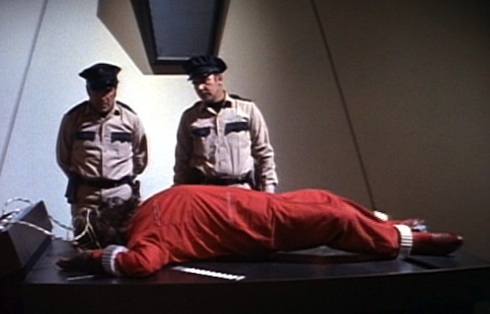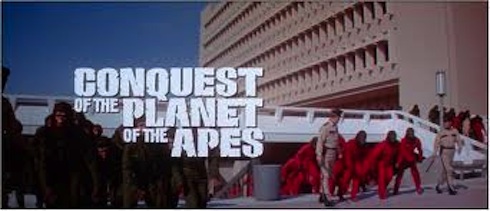Of all the Apes films, this fourth entry in series seems to have the most in common with the forthcoming Rise of the Planet of the Apes film insofar as it depicts the apes actually taking over the planet. Conquest is in a separate category of films as it serves as both a sequel to the previous film and a prequel to the first two films. How is that possible you ask? Come on, this is science fiction! And it’s the Planet of the Apes series; a really long house party where continuity is treated like a bong the writers take a hit from every once and awhile to keep themselves on track. Anyway, if the last film was a comedy which turns into a tragedy, Conquest is a tragedy all the way through. The bad news is it’s a little one-note. The good news is Roddy McDowall is probably at his best in this one.
When we last left the child of Zira and Cornelius in Escape from the Planet of the Apes he was a little baby chimp named Milo living in Señor Armando’s (Ricardo Montalban) circus. At the start of Conquest we’re told it’s no longer the 70s, but rather the 90s and Milo has been renamed Caesar. This isn’t explained onscreen, though we have to infer Armando changed Milo’s name to Caesar to protect his true identity. At the start of the film Armando has shifted from being the slightly comic character he was in Escape to a grim, deadly serious man who is painfully trying to protect Caesar from the harsh realties of this brave new world. Armando’s attitude toward Caesar is paternal and Montalban pulls off some pretty emotional stuff right from the start. Roddy McDowall also manages to make the son of Cornelius a separate character entirely. I’ll point out here that the triumph of McDowall’s performance in all the Apes movies (along with Kim Hunter) is a conveyance of emotional range almost exclusively through the eyes. Pretty impressive stuff.
The reason I lean so heavily on the acting with this one is that this movie would likely be totally unwatchable if it had a schlocky cast. The actual plot isn’t that great. It’s not confusing like Beneath, in fact, just the opposite. Ultimately this movie is just about a slave revolution, which isn’t inherently uninteresting, but when faced with the more complex evolutionary inversions and mediations on intelligence and morality of the previous films, this premise feels a little basic. But between McDowall’s Caesar, Montalban’s Armando, and Hari Rhodes as the levelheaded human MacDonald, the almost theatrical chops of everyone involved are pretty awesome. However, they do have to contend with a plot!
In the time that has passed from the previous film the epidemic that wipes out all cats and dogs has actually happened. To prove this to the audience, we are shown a statue in memory of all the cats and dogs, which Armando explains to Caesar at the start of the film. Post cat and dog extinction, in just a few decades, the apes went from replacement pets, to servants, to slaves. As in the previous film, if you can bring yourself to either accept or simply forgive the notion that cats and dogs dying is the trigger that really causes all of this, then you can move forward with the movie. If you can’t you’ll be stuck laughing at the tiny little dog and cat memorial statue forever.
Anyway, Armando takes Caesar around the city (essentially just a shopping mall) to show him what society is really like. Caesar immediately gets incensed by the treatment of the various apes and cries out “you human bastards.” Of course, a talking ape is a big deal to this new fascist society, and everyone starts to freak out big time. Armando tries to cover for Caesar by claiming he was the one who yelled out, but “the man” isn’t buying it and chaos ensues. Armando tells Caesar to run away while he’ll go to the authorities and try to sort everything out. This ends up with Armando getting chucked out of a window. Yep. Not even halfway through the movie, Ricardo Montalban is totally dead.

Meanwhile, Caesar gets apprehend and processed in Ape Management where he’ll essentially become part of the slave labor force. Conquest is a lot heavier handed than perhaps any of its predecessors in these scenes as the depictions of the conditioning of the apes is pretty brutal. What exactly is the analog for these scenes in terms of social commentary? Well, I don’t think there is a specific one, which is sort of why it works. Though MacDonald later makes some allusions to being descended from slaves, it comes across not as preachy, but as something someone would probably say when faced with a super radical, revenge-driven ape. In short, Conquest is not making direct commentary about past slavery, nor is it critiquing contemporary animal rights issues. Instead, it is speculating on humans turning a blind eye to highly inhumane behavior in a potential future society.
Eventually, as we knew was coming, Caesar organizes a massive revolution complete with Gorillas wielding machetes, explosions and lots of grunts from the various apes. Roddy McDowall gets to perform perhaps the most rousing speech in all the films during the climax in which he basically says “we’re in charge now.” Because MacDonald assisted in freeing Caesar, he challenges the new revolutionary leader to spare the lives of the remaining humans. Between this and Caesar’s girlfriend Lisa (Natalie Trudy) saying “no,” he sort of amends his speech to say that the apes should “cast out their vengeance” before reminding us that this is the birth of “The Planet of the Apes.” Interestingly, the original ending to this film did not include Caesar’s decision to be merciful. Instead, it ended with the all the apes beating the humans to death with the butts of their guns. Apparently the test audiences hated this so much that it was changed. Personally, I prefer the change, as I think it’s more consistent with Caesar’s character, and it’s also how I remember the film the first time.
Conquest of the Planet of the Apes effectively completes a paradox in terms of trying to explain how the ape-dominated Earth came into being. Though the notion of an ape-dominated society being created by involvement from the future sort of undermines the whole evolutionary inversion concept presented by Boulle’s original novel, I’ve always liked the ending of Conquest. It’s not a twist or anything like that, but it does feel satisfying. Again, the speech and McDowall’s performance sort of carry these over-the-top themes, but if one is worried about the Apes films being over-the-top, now is not the time turn away. Because before you know it, Caesar will be back to Battle for the Planet of the Apes!
Ryan Britt is a staff writer for Tor.com.










